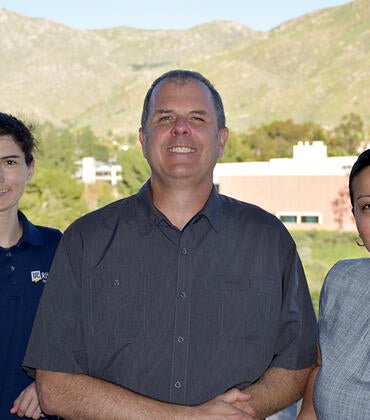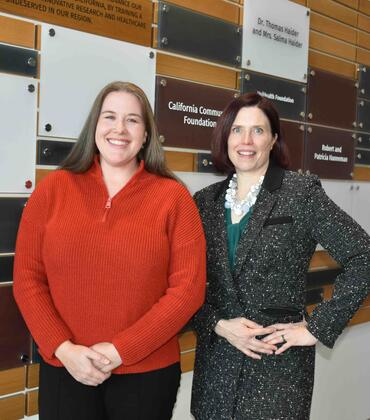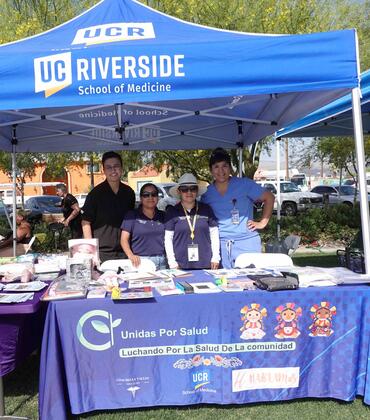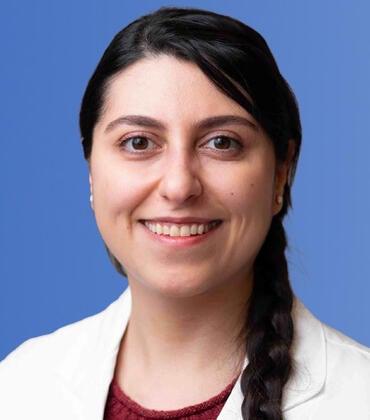
On Monday, the UCR School of Medicine hosted the Biomedical Sciences 50th Anniversary Symposium, marking the culmination of the department’s yearlong anniversary celebration. The event welcomed alumni, former faculty and staff, and current faculty, staff, and students to reflect on the impact of Biomedical Sciences over the years while looking forward to the future.
Photos from the event can be found here.
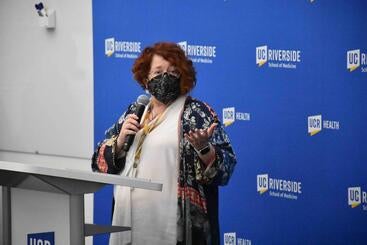
“We are legendary,” said Biomedical Sciences Chair Monica Carson, PhD, alluding to the symposium’s theme of "the legends of today and tomorrow." Her introduction emphasized the Biomedical Sciences department’s role in educating medical students for decades through the UCR/UCLA Thomas Haider Program in Biomedical Sciences, laying the foundation for the School of Medicine’s founding in 2013. “It’s been quite incredible how the vision from the very earliest time has come to fruition and shaped how biomedical research is done on this campus,” Carson said, highlighting the department’s four research centers and numerous labs at UCR.
The symposium included two keynote speakers with ties to the department. Biomedical Sciences alumna Christine Dauphine, MD, Breast Clinic director in the Division of Surgical Oncology at Harbor-UCLA, presented on her breast cancer research, and former Biomedical Sciences faculty member John Shyy, PhD, now a professor at UC San Diego, gave an address titled “Endothelial Cell Biology Evolved From Riverside.”
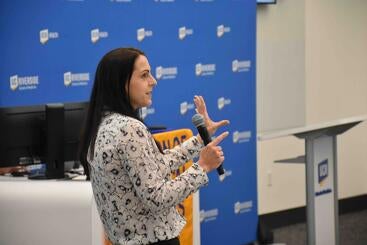
Dauphine, who graduated from UCLA in 2000 after completing her initial medical training at UCR through the seven-year UCR/UCLA program, expressed her excitement at returning to UCR’s campus. “I have a photo of where we used to have our lectures, and it was nothing like this,” she said with a laugh.
Dauphine shared photos and memories from her time at UCR, highlighting the close ties among her 24-person class. She then presented some of her research into screening and diagnosis outcomes through her keynote address, “A Research Journey to Examine Health Disparities in Breast Cancer Care.”
The event also included several other research presentations and panel discussions featuring former and current faculty as well as current students and postdoctoral scholars.
Meera Nair, PhD, associate dean of Biomedical Research and a professor of Biomedical Sciences, moderated the first panel, “Our Legends: 50 Years of History and Impact.” The discussion included Neal Schiller, PhD, distinguished teaching professor emeritus of Biomedical Sciences; Ameae Walker, PhD, professor emeritus of Biomedical Sciences; Craig Byus, PhD, professor emeritus of Biomedical Sciences and Biochemistry; Carl Ware, PhD, professor emeritus of Biomedical Sciences and director and professor, Laboratory of Molecular Immunology at Sanford Burnham Prebys; and Dauphine as a Biomedical Sciences alumna.
When asked to reflect on memories from Biomedical Sciences that shaped them, Dauphine described a lab activity that used urine testing to examine the effects of alcohol intake on a group that first drank water versus a group that didn’t. “Needless to say, I drove my two very drunk roommates home at the end of this experience, and we all had a laugh,” she recalled, pointing to the experience as a fun but effective way to help students learn. “I’m not sure how it was allowed,” she added.
“Science,” Schiller replied with a shrug.
Byus emphasized the importance of the faculty and their role in recruiting new faculty members to continue the department’s legacy. “The faculty relied on each other… and we were able to survive, and flourish even, because we worked with each other,” he said. “That’s something important to continue now.”
"This anniversary is a significant milestone in the history of the UCR School of Medicine,” added Deborah Deas, MD, MPH, the vice chancellor for health sciences and the Mark and Pam Rubin dean of the School of Medicine. “We’ll continue to push the boundaries of knowledge, to educate and inspire the next generation of scientists and physicians, and to serve our community.”
